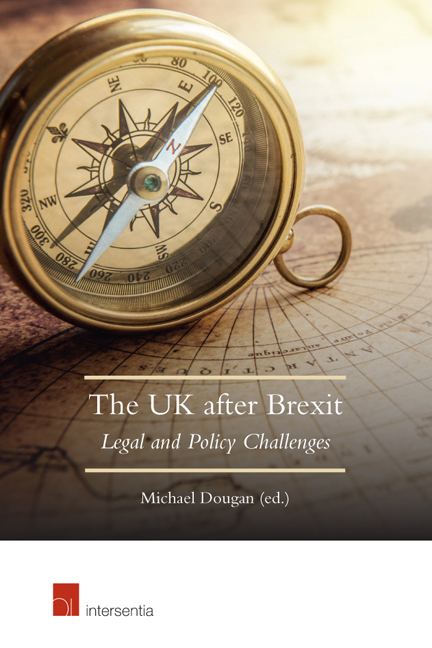Book contents
- Frontmatter
- Contents
- List of Authors
- Editor's Introduction
- Part I Constitutional Issues
- Chapter 1 Brexit: The Relationship between the UK Parliament and the UK Government
- Chapter 2 Devolution
- Chapter 3 The ‘Brexit’ Threat to the Northern Irish Border: Clarifying the Constitutional Framework
- Chapter 4 Brexit and UK Courts: Awaiting Fresh Instruction
- Part II Substantive Policies
- Part III External Relations
- About the Editor
Chapter 3 - The ‘Brexit’ Threat to the Northern Irish Border: Clarifying the Constitutional Framework
from Part I - Constitutional Issues
Published online by Cambridge University Press: 13 October 2018
- Frontmatter
- Contents
- List of Authors
- Editor's Introduction
- Part I Constitutional Issues
- Chapter 1 Brexit: The Relationship between the UK Parliament and the UK Government
- Chapter 2 Devolution
- Chapter 3 The ‘Brexit’ Threat to the Northern Irish Border: Clarifying the Constitutional Framework
- Chapter 4 Brexit and UK Courts: Awaiting Fresh Instruction
- Part II Substantive Policies
- Part III External Relations
- About the Editor
Summary
INTRODUCTION
Of all the regions of the United Kingdom, it is widely believed that Northern Ireland is likely to be most deeply affected by withdrawal from the European Union – notwithstanding the fact that 56 per cent of the electorate there who voted on 23 June 2016 expressed their desire to remain. Equally, of all remaining Member States of the EU itself, it is widely accepted that the Republic of Ireland will be most deeply affected by the departure of the United Kingdom – even though the Republic's population obviously had no direct say in the UK referendum. Indeed, as the House of Lords has observed: the whole network of tripartite relations, running north and south, east and west, that link together both past and future relations between the Republic, Northern Ireland and the rest of the UK now face significant challenges.
To be fair, the salience of certain issues has perhaps been exaggerated: for example, it is difficult to see how UK withdrawal from the EU could, simply in and of itself, amount to a breach of either the Belfast (Good Friday) Agreement or the British-Irish Agreement. Nevertheless, the causes for legitimate concern remain myriad: one need only consider the particular vulnerability of crossborder trade, supply chains and labour forces to the impact of imminent UK departure from the single market; the relative dependence of Northern Ireland's agricultural sector upon EU funding and indeed of its economy as a whole upon public sector employment; and the threats to maintaining strong cooperation in fields ranging from security to healthcare and energy supply. The ultimate concern is that the cumulative effects of economic uncertainty and instability, fundamental changes to the longstanding constitutional framework which has underpinned the peace process, and the potential for one or both of the main communities to feel that important aspects of their identity are under pressure, will render even more difficult the task of securing political stability and promoting social cohesion.
- Type
- Chapter
- Information
- The UK after BrexitLegal and Policy Challenges, pp. 53 - 72Publisher: IntersentiaPrint publication year: 2017

